
Raphael, "School of Athens" (detail Plato and Aristotle), 1509-1511. Palazzi Pontifici, Vatican.
About Philosophy
Sources: Several
The term “philosophy” derives from the Greek word “Φιλοσοφία-Filosofia” which translates to a “love of wisdom,” coined by pre-Socratic thinkers such as Pythagoras in the 6th century B.C. These ancient Greek philosophers were influential in laying the foundations for the modern world; searching for meaning in everyday life and shaping their musings into a system of thoughts documented in books and manuscripts, letters, plays, and other media.
What is Philosophy?
Philosophy can be described as the rational, abstract, and methodical consideration of reality. Philosophy has been a central fixture in the history of civilization, from ancient Greece to modern day. In the centuries that have passed, notable philosophers both young and old have produced original thoughts and made contributions to all industries and disciplines including politics, mathematics, literature, art, and science. Below are some of the most influential philosophers, their schools of thought, and what we can learn from their forward-thinking approach.
Thales of Miletus (c. 624/623 – c. 548/545 B.C.)
Thales was probably born in the city of Miletus in Ionia, Asia Minor around the mid-620s BC. He was a pre-Socrates philosopher, one of the Seven Sages of Greece, a mathematician and astronomer. According to Herodotus, Thales predicted the solar eclipse of May 28, 585 BC.
Many, most notably Aristotle, regarded him as the first philosopher in the Greek tradition, and he is otherwise historically recognized as the first individual in Western civilization known to have entertained and engaged in scientific philosophy. Almost all the other pre-Socrates philosophers followed him in explaining nature as deriving from a unity of everything based on the existence of a single ultimate substance, instead of using mythological explanations.
Bertrand Russell said that "Western philosophy begins with Thales."
Thales of Miletus / Quotes
- The most difficult thing in life is to know yourself. Self-knowledge is a very lonely journey and requires some skills.
The phrase "Γνώθι σαυτόν, Know thyself" – "know yourself" is engraved in the oracle of Delphi, and was used regularly by Socrates (469 - 399 BC). The purpose of the self-knowledge is mainly to improve the relationship with yourself as well as with the people with whom you relate. - "Κnow thy measure". Do everything in moderation.
- "The elder of beings is God, because he is unborn and has no beginning or end"
"The most beautiful thing is the World, why it is the work of God".
Pythagoras of Samos (c. 580/570 – 495 B.C.)
Pythagoras of Samos was a Greek philosopher and the eponymous founder of Pythagoreanism. His political and religious teachings were well known in Magna Graecia and influenced the philosophies of Plato, Aristotle, and, through them, Western philosophy. Knowledge of his life is clouded by legend, but he appears to have been the son of Mnesarchus, a gem-engraver on the island of Samos. Around 530 BC, he travelled to Croton in southern Italy, where he founded the Pythagorean School in which initiates were sworn to secrecy and lived a communal, ascetic life.
In antiquity, Pythagoras was credited with many mathematical and scientific discoveries, including the Pythagorean theorem, Pythagorean tuning, the regular solids, the Theory of Proportions, the sphericity of the Earth, and the identity of the morning and evening stars as the planet Venus. It was said that he was the first man to call himself a philosopher ("lover of wisdom") and that he was the first to divide the globe into five climatic zones.
Confucius (c. 551 – 479 B.C.)
Confucius, also referred to as Kong Qui or K’ung Fu-tzu, was a Chinese philosopher, teacher, and political figure largely considered the father of the Eastern style of thought. His teachings focused on creating ethical social relationships, setting educational standards, and promoting justice and honesty.
His social philosophy was based on the principle of “ren”—loving others— and he believed this could be achieved using the Golden Rule:
“What you do not wish for yourself, do not do to others.”
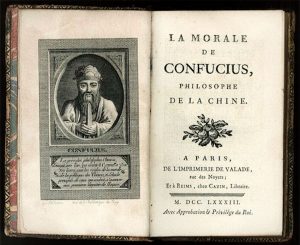 “La Morale de Confucius” sold for €100 via Arenberg Auctions (December 2018)
“La Morale de Confucius” sold for €100 via Arenberg Auctions (December 2018)
Other Confucius Guiding Principles:
“Success is a work in progress. Keep moving towards your dream no matter how long it takes.”
[ Compare to Aristotle's quote: "Don't give up, but continue to work hard and strive for greatness, until you excel"]
“It does not matter how slowly you go so long as you do not stop.”
Socrates (c. 469 – 399 B.C.)
He is considered the primary philosopher of Western thought. There are no written essays by Socrates. Much of what we know of his life was recorded by others, Aristotle, Xenophon, and mainly from his student Plato. He is one among others who changed forever the perception of philosophy and influenced almost all later philosophical schools. The "Socratic method" laid the groundwork for Western systems of rational philosophy, delivering a belief that through the act of questioning, the mind can manage to approach the truth.
Socrates believed that philosophy should achieve practical results for the greater well-being of society. He emphasized the idea that the more a person knows, the greater his or her ability to reason and make choices that will bring true happiness.
Every day we face to a dilemma to choose between convenient conventionality and devotion to ethics. Socrates preferred to ignore hypocrisy and honoured his care to truth and justice, to morality, although in the end it cost him his own life.
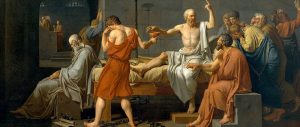 The death of Socrates
The death of Socrates
"One needs to take care of his soul, get to know himself first, before starting caring for others".
"Nothing is going to change if you do not change it yourself ".
"I know that I know nothing" is a dictum derived from Plato's "Apology" attributed to the Greek philosopher Socrates. It is also called the Socratic paradox. The phrase is not one that Socrates himself is ever recorded as saying. It is a consequence coming from the dialectical method of Socrates teaching, which was based on the fact that as a teacher he pretended to know nothing, so he would gain knowledge from his interlocutors through dialogue, questions and answers.
Platon (c. 428 – 348 B.C.)








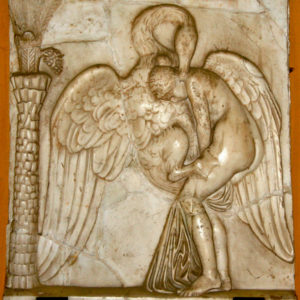





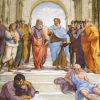
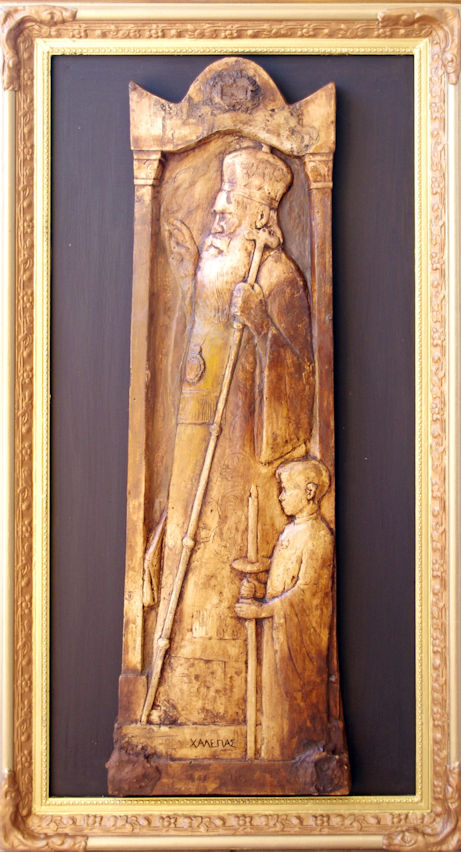
Admin
Admin